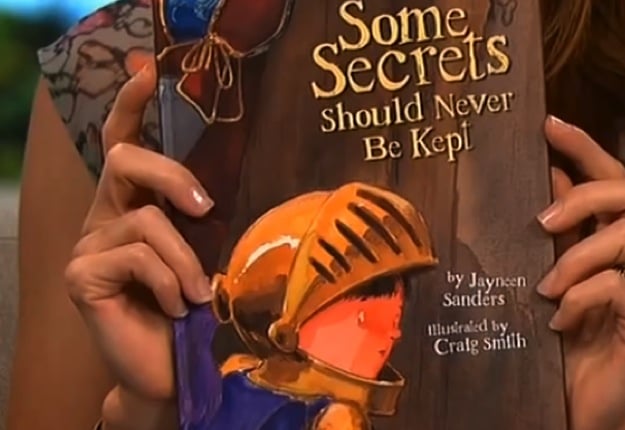The statistics on the sexual abuse of children are staggering.
Some estimates place the incidence as high as 1 in 3 girls and 1 in 6 boys are sexually abused before their 18th birthday (Aust. Institute of Criminology, 1993).
As parents, teachers and community members, what can we do to ensure both our children and children we come in contact with are protected, informed and safe? These 4 key points are crucial.
- Education – Learn how to protect your child from sexual abuse by educating them in Body Safety, and educating yourself and your community.
- Awareness – Become aware of the statistics surrounding child sexual abuse and grooming techniques used by pedophiles.
- Know the Signs – Understand and recognize the signs of child sexual abuse.
- Believe a Child – Believe a child when they disclose sexual abuse—it is paramount for their future recovery and healing.
1. Education – Teaching Your Child Body Safety
The most vulnerable age for children to be exposed to sexual abuse is between 3 and 8 years with the majority of onset happening between these ages (Browne & Lynch, 1994).
We teach road safety and we teach water safety—it is imperative we teach children Body Safety. If you are concerned about teaching your child these skills, just keep in mind they are age-appropriate, non-graphic, and they also encourage your child to be assertive—a crucial skill in any bullying situation, and a great attribute to have when your child becomes a teenager!
As soon as your child begins to talk and is aware of their body parts, begin to name them correctly, e.g. toes, nose, eyes, etc. Children should also know the correct names for their genitals from a young age. Try not to use ‘pet names’. This way, if a child is touched inappropriately, they can clearly state to you or a trusted adult where they have been touched.
Teach your child that their penis, vagina, bottom, breasts and nipples are called their ‘private parts’ and that these are their body parts that go under their swimsuit. Note: a child’s mouth is also known as a ‘private zone’.
Teach your child that no-one has the right to touch or ask to see their private parts, and if someone does, they must tell you or a trusted adult straightaway. Reinforce that they must keep on telling until they are believed. (Statistics tell us that a child will need to tell three people before they are believed.) As your child becomes older (3+) help them to identify five trusted adults they could tell. These people are part of their ‘safety network’. Have your child point to each digit on their hand and say the names of the people on their ‘safety network’.
Teach you child that if some-one (i.e. the perpetrator) asks them to touch their own private parts, shows their private parts to the child or shows them images of private parts that this is wrong also, and that they must tell a trusted adult straightaway. Reinforce that they must keep on telling until they are believed.
At the same time as you are discussing inappropriate touch, talk about feelings. Discuss what it feels like to be happy, sad, angry, excited, etc. Encourage your child in daily activities to talk about their feelings, e.g. ‘I felt really sad when … pushed me over.’ This way your child will be more able to verbalize how they are feeling if some-one does touch them inappropriately.6.Talk with your child about feeling ‘safe’ and ‘unsafe’. Discuss times when your child might feel ‘unsafe’, e.g. being pushed down a steep slide; or ‘safe’, e.g. snuggled up on the couch reading a book with you. Children need to understand the different emotions that come with feeling ‘safe’ and ‘unsafe’. For example, when feeling ‘safe’, they may feel happy and have a warm feeling inside; when feeling ‘unsafe’ they may feel scared and have a sick feeling in their tummy.
Discuss with your child their ‘early warning signs’ when feeling unsafe, i.e. heart racing, feeling sick in the tummy, sweaty palms, feeling like crying. Let them come up with some ideas of their own. Tell your child that they must tell you if any of their ‘early warning signs’ happen in any situation. Reinforce that you will always believe them and that they can tell you anything.
As your child grows, try as much as possible to discourage the keeping of secrets. Talk about happy surprises such as not telling Granny about her surprise birthday party and ‘bad’ secrets such as someone touching your private parts. Make sure your child knows that if someone does ask them to keep an inappropriate secret that they must tell you or someone in their ‘safety network’ straightaway.
Discuss with your child when it is appropriate for someone to touch their private parts, e.g. a doctor when they are sick (but making sure they know you must be in the room). Discuss with your child that if someone does touch their private parts (without you there) that they have the right to say: ‘No!’ or ‘Stop!’ and outstretch their arm and hand. Children (from a very young age) need to know their body is their body and no-one has the right to touch it inappropriately.
Read your child ‘Some Secrets Should Never Be Kept’ on a monthly to two monthly basis when your child is young. The book can be read and reread to children 3 to 12 years. It is also ideal to read before camps, sleepovers, etc. Go to www.somesecrets.info for more information and purchasing details. Also teach your child ‘The Body Safety Song’ at http://somesecrets.info/body-safety-song/
Lastly, sexual abuse prevention education is not only a parent’s responsibly, it is also the community’s responsibility. Ask your child’s kindergarten or elementary school if they are running such a program. If they are not, ask why not. And PLEASE lobby for it. Remind them that sexual abuse is irreversible but it can be preventable.
2. Awareness
Statistics tell us that 95% of sexually abused children will know their perpetrator (Child Protection Council, 1993).
They will be an immediate family member, a close family friend or some-one the child has regular contact with.
Be aware of any person who wishes to spend a great deal of time with your child, seeking out their company and offering to take care of them at any time. For example, an abuser will often ‘help out’ the targeted family at short notice, appearing as a reliable and trustworthy friend. This is the persona a pedophile will go to great lengths to establish.
Be aware of any person who pays special attention to your child, making them feel more special than any other child; providing them with special treats, presents, sweets, etc. These ‘treats’ may be provided without your knowledge, and be the first of your child’s secrets they are being groomed to keep.
Be aware of any person who spends a large percentage of their out-of-hours recreation time with children—often without other adults present or preferring to be ‘alone’ with the children.
In saying the above, of course we want our children to spend quality and loving time with the special adults in their lives. However, it is important we stay alert.
Important Things to Know About Pedophiles
1. Pedophiles can be any person in the community and from any social democratic. They can be single, married and have families of their own. Up to 95% of child sexual abusers are male (Bagley, 1995).
2. 1/3 of reported offenses are committed by adolescents (Bagley, 1995) and increasingly a child can be abused by another child slightly older than themselves.
3. Children who live with a single parent that has a live-in partner are at the highest risk: they are 20 times more likely to be victims of sexual abuse than children living with both biological parents (Sedlack et al, 2010). However, children living with both biological parents or in foster care can be targeted.
4. Pedophiles plan their abuse in detail, sometimes over years—grooming both the victim and their family by portraying the persona of a friendly, helpful and reliable person.
5. Pedophiles will actively encourage the targeted child to keep secrets. The secret at first may not be of a sexual nature. These ‘fun’ secrets are intended to build up a sense that the abuser and the child have a ‘special’ relationship.
6. Pedophiles convince the victim that the abuse is normal and love-based. They will use ‘guilt’ and ‘blaming’ techniques to coerce the child into believing that they are an equal participant in the ‘shameful’ secret, and therefore are equally too blame. The child can be so ‘guilt ridden’ they may never disclose.
7.Pedophiles use threats and bribes to ensure the child keeps the secret. ‘Keeping the secret’ is of extreme importance to the offender — if the child does tell, the consequences for the offender are catastrophic. Therefore, they will use whatever means they can to ensure the child never tells. This includes subtly discrediting the child by making them out to be a liar—so if they ever do disclose, they won’t be believed.
3. Know the signs
Note: one or more of these indicators does not mean your child is being sexually abused, but if they do show some of these indicators, then there is good reason to investigate further.
General Signs of Sexual Abuse (0 to 12 years):overly interested in theirs or other’s genitals, continually wants to touch private parts of other children. Instigating and/or forcing ‘sex play’ with another child (often younger, more than 3 years difference in age) sex play that is not appropriate i.e. oral genital contact between a 7 year old and a 4 year old (note: with the increase in pornography viewing on the internet by young children, sex play is becoming more worrisome among similar-aged children) sex play with another child happening more than three times, despite careful monitoring and discussion about inappropriateness. Ppersistent masturbation that does not cease when told to stop, sexualized play with dolls or toys, sexualized play involving forced penetration of objects vaginally or anallychronic peeping, exposing and obscenities, touching or rubbing against the genitals of adults or children that they do not know, persistent use of ‘dirty’ words, describing sexual acts and sexualized behavior beyond their years, strong body odorsores around the mouth, bruising or bleeding in the genital area; bruising to breasts, buttocks, lower abdomen or thighs, withdrawn and anxious behavior, secretive or say they have a ‘special’ secret that can’t tell (this may be to gauge your reaction), child or child’s friend telling you about interference directly or indirectly, going to bed fully clothed, increase in nightmares and sleep disturbances, regressive behavior, e.g. a return to bed-wetting or soiling, unexplained accumulation of money and gifts, not wanting to go to a certain person’s place or to an activity, indirectly dropping hints about the abuse (again, to gauge your reaction).
In Older Children (Adolescents):Note: they may also display some of the above indicators self-destructive behavior such as drug dependency, suicide attempts, self-mutilation eating disorders, adolescent pregnancy, persistent running away from home, withdrawn, angry, pornography interest; verbally sexually aggressive obscenities.
4. Believe a Child
I cannot reinforce strongly enough how important it is to believe a child if they disclose sexual abuse. In 98% of reported child sexual abuse cases, children’s statements were found to be true (NSW Child Protection Council, Cited In Dympna House, 1998).
Our reaction to a child’s disclosure is crucial to their ongoing well-being and healing. It we react with disbelief, they may never tell again and their suffering will only increase. It we react with shock, horror and/or anger, the child will most certainly take their cues from us, and believe that in some way they are to blame. It takes an enormous amount of courage for a child (or adult) to disclose sexual abuse that may have been ongoing for years. They will, no doubt, have been threatened with horrific consequences were they to tell.
To find the bravery to overcome such threats, is a true act of courage.
But what a child needs more than anything from the person they disclose to—be it a parent, relative, teacher or friend—is compassionate reassurance. Therefore, stay calm and reassure the child you believe them, reassure the child they have done the right thing in telling, reassure the child that they are incredibly brave and courageous, reassure the child that they are in NO way to blame, reassure the child that they are loved, reassure the child that they are safe and will be looked after, reassure the child that you will do everything you can to stop the abuse.
It is our responsibility and duty of care to the child, to remain calm as well as receptive and compassionate, once the child begins to disclose. If they disclose amongst a group, take the child aside and find a safe place for them to continue. A disclosure from any sexual abuse victim takes an enormous amount of courage—so please, as the trusted recipient, respond to such bravery with kindness and compassion. Statistics on child sexual abuse http://somesecrets.info/blog/2014/1/20/10-confronting-child-sexual-abuse-statistics and http://somesecrets.info/blog/2014/1/20/terrifying-statistics-linking-child-sexual-abuse-and-the-internet
Jayneen Sanders is a teacher, author, mother of three teenage daughters and an active advocate for sexual abuse prevention education both in the home and in schools.For more information on this topic and Jay’s children’s book on safe and unsafe touch: ‘Some Secrets Should Never Be Kept’ go to www.somesecrets.info
Now available on Amazon in 7 seven languages. http://www.amazon.com/Jayneen-Sanders/e/B00BDCGZ1W/ref=ntt_athr_dp_pel_1 Key Organisations for Further HelpRAINN: http://www.rainn.org/get-helpChildhelp: http://www.childhelp.org/pages/hotline-home





















1:12 pm
9:34 pm
2:54 pm
3:10 pm
9:47 pm
10:13 am
11:16 am
-

-
-
Jayneen Sanders replied
- 03 Oct 2014 , 8:39 pm
Reply9:45 pm
-

-
-
Jayneen Sanders replied
- 03 Oct 2014 , 8:40 pm
Reply4:45 pm
-

-
-
Jayneen Sanders replied
- 18 Aug 2014 , 10:52 pm
Reply1:39 pm
-

-
-
Jayneen Sanders replied
- 17 Aug 2014 , 9:12 pm
Reply4:50 pm
-

-
-
Jayneen Sanders replied
- 17 Aug 2014 , 8:42 am
-

-
-
june11 replied
- 04 Sep 2014 , 11:57 am
Reply10:02 am
-

-
-
Jayneen Sanders replied
- 17 Aug 2014 , 8:39 am
Reply5:56 pm
-

-
-
Jayneen Sanders replied
- 26 Jul 2014 , 9:44 pm
Reply9:43 am
-

-
-
Jayneen Sanders replied
- 26 Jul 2014 , 9:41 pm
-

-
-
Jayneen Sanders replied
- 26 Jul 2014 , 9:43 pm
Reply6:56 pm
-

-
-
Jayneen Sanders replied
- 20 Jul 2014 , 8:29 pm
Reply6:03 pm
-

-
-
Jayneen Sanders replied
- 20 Jul 2014 , 8:28 pm
Reply10:00 am
-

-
-
Jayneen Sanders replied
- 20 Jul 2014 , 8:26 pm
Reply11:45 am
-

-
-
Jayneen Sanders replied
- 09 Jul 2014 , 6:16 pm
Reply2:13 pm
-

-
-
Jayneen Sanders replied
- 04 Jul 2014 , 10:28 pm
Reply12:40 pm
-

-
-
Jayneen Sanders replied
- 04 Jul 2014 , 10:25 pm
Reply- 1
- 2
- 3
- »
Post a commentTo post a review/comment please join us or login so we can allocate your points.